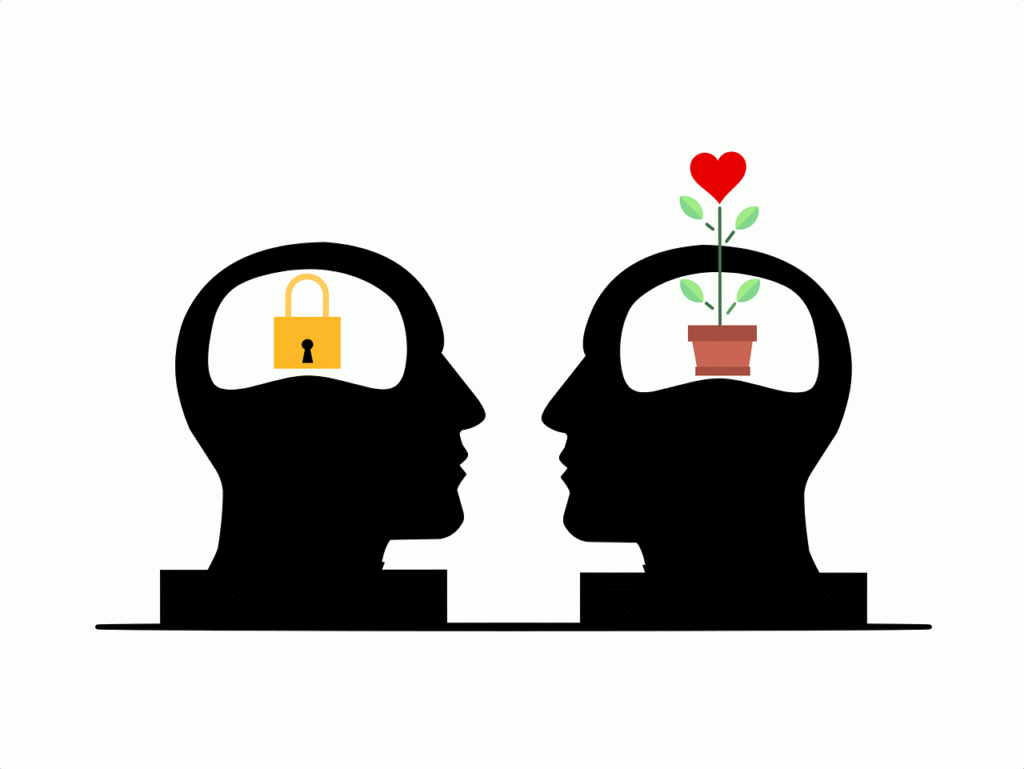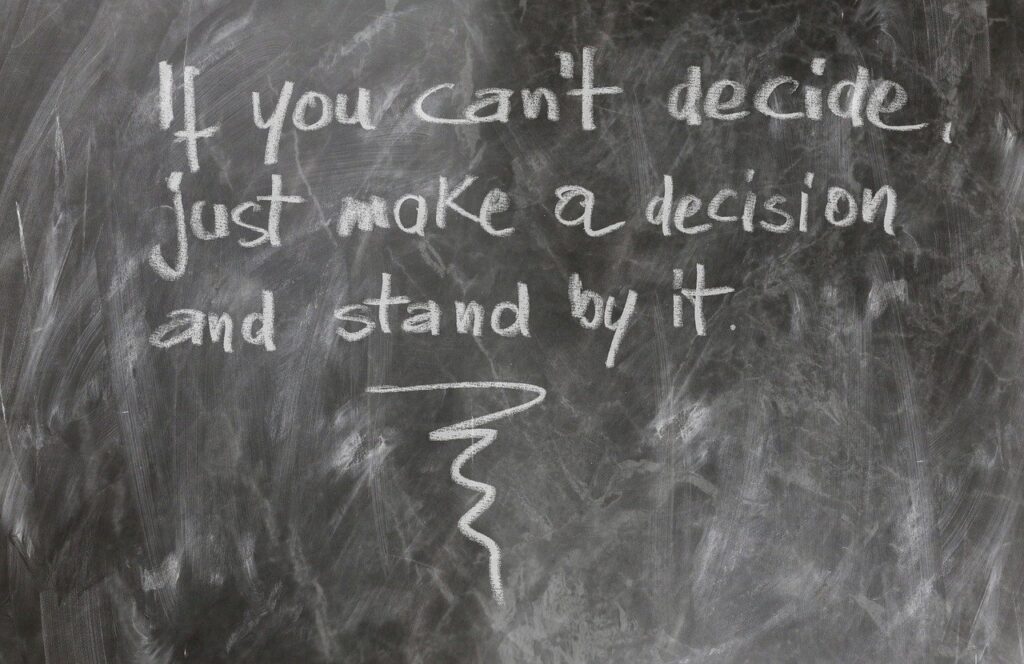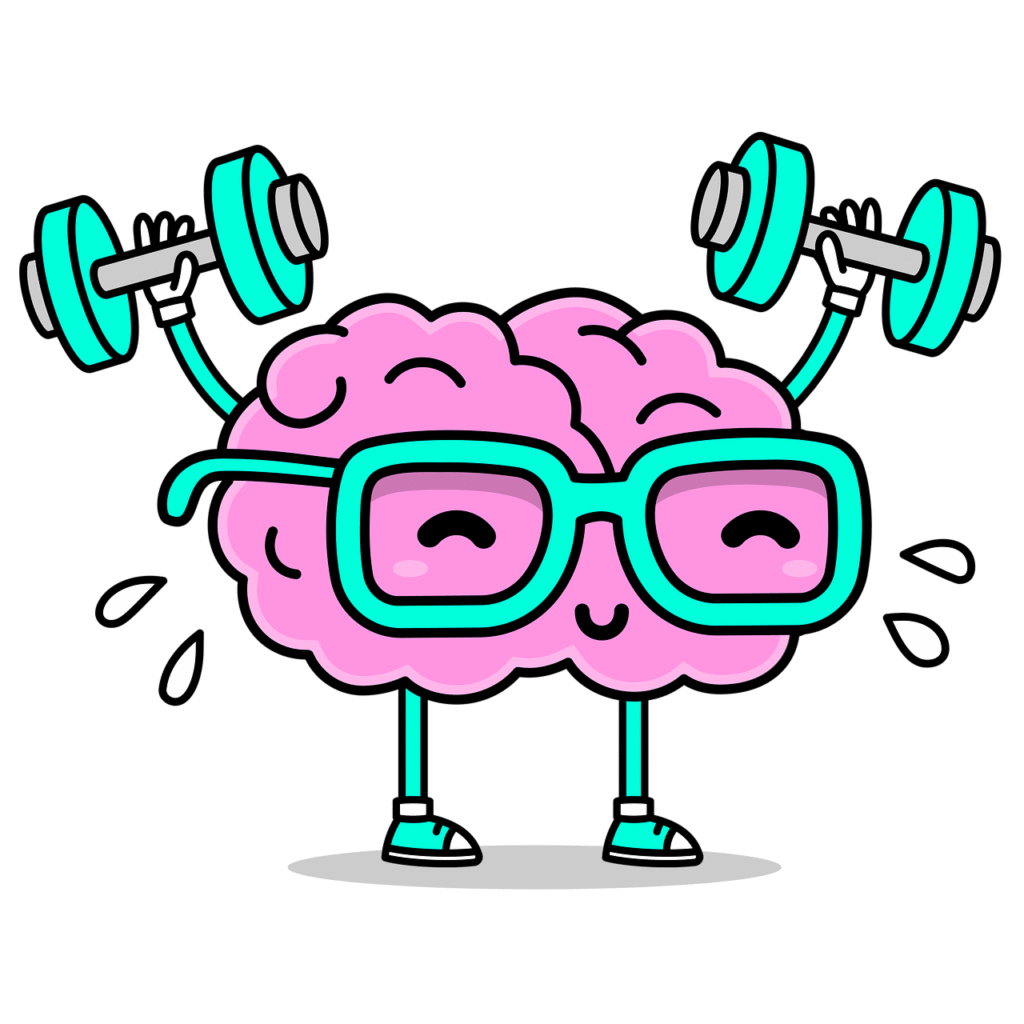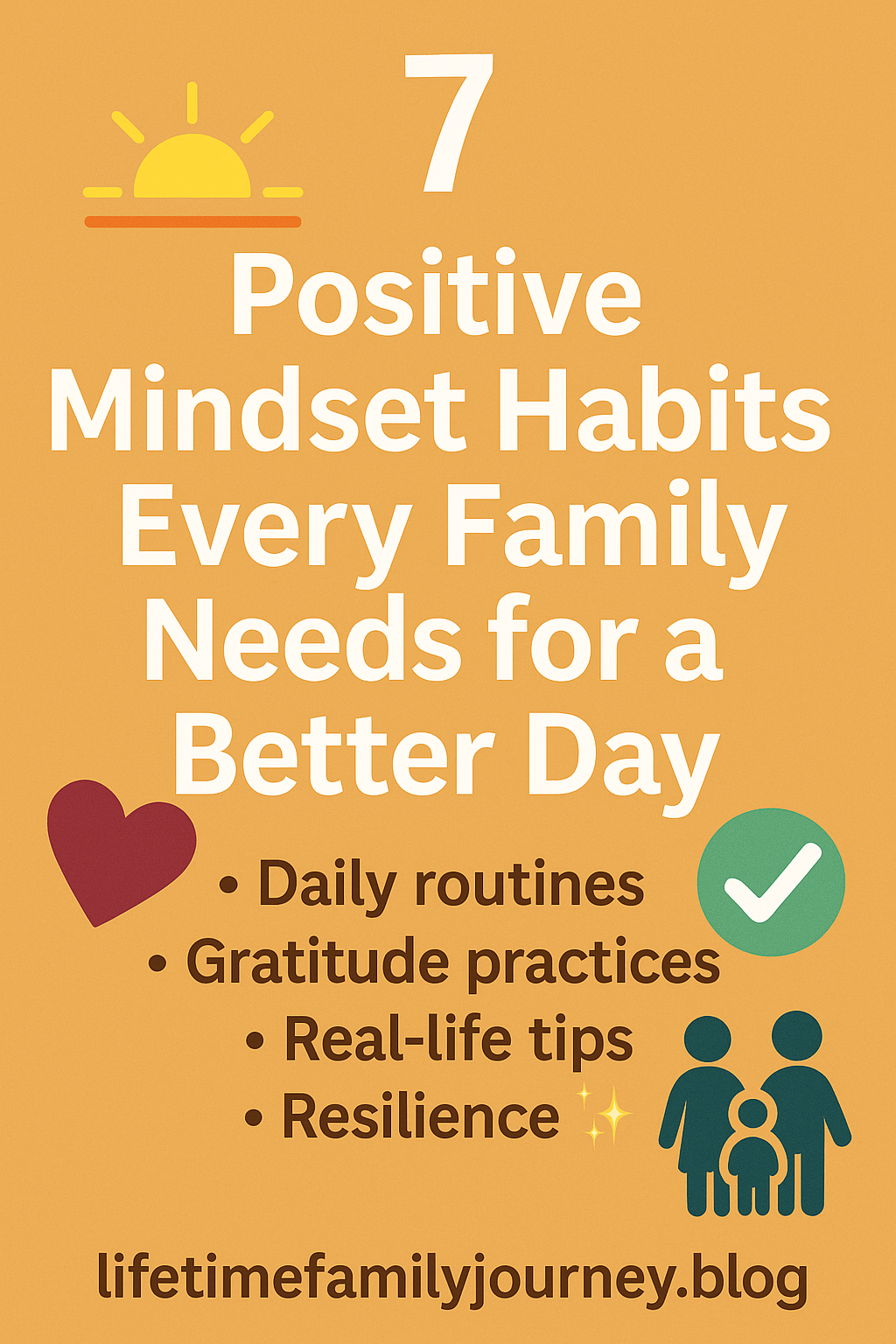7 Positive Mindset Habits That Transform Your Life ✨
Let me tell you something that took me twenty years of marriage, six kids, and a military career to truly understand: your mindset isn’t just some fluffy self-help concept—it’s the engine that drives everything else in your life. 💪

I used to roll my eyes at positivity talk. Thought it was for people who hadn’t faced real challenges. Then life happened. Deployments, sleepless nights with crying babies, financial stress, watching my wife juggle teaching middle schoolers while managing our circus at home. That’s when I learned the difference between toxic positivity and genuine positive mindset habits.
The struggle is real, yes, but it’s also absolute. Your mindset determines the outcome. Make it positive. ⚡
Why Most People Get Positivity Wrong 🤔
Here’s what drives me crazy: people think being positive means pretending everything’s sunshine and rainbows. That’s garbage. Real positive thinking benefits come from acknowledging the hard stuff while choosing how you respond to it. 🎯
When my youngest daughter broke her arm last spring, I didn’t stand there saying “everything happens for a reason” while she screamed in pain. I held her, got her help, and then chose to focus on how tough she was being. That’s the difference.
Research from Harvard Medical School shows that people who practice daily positivity practices experience 23% lower stress hormones and significantly better cardiovascular health. But here’s the kicker—it only works when it’s authentic. 📊
You can’t fake your way to a better mindset. Trust me, your kids will call you out faster than a drill sergeant if you’re being phony. 😅

The 3 Pillars of Genuine Positivity 🏗️
After years of figuring this out the hard way, I’ve narrowed it down to three core areas that actually move the needle. These aren’t Instagram quotes—they’re battle-tested strategies that work when life gets messy. 💯
Pillar 1: Being Better Beings 🤝
Make it a point to help someone; don’t be the person watching someone struggle.
This isn’t about grand gestures. Last week, I saw our neighbor struggling to get groceries inside with her toddler having a meltdown. Instead of pretending I didn’t notice, I grabbed two bags and helped her out. Took three minutes. Made both our days better. ✨
Studies from the University of Michigan prove that helping others triggers the same reward centers in your brain as receiving help. It’s literally a biological happiness hack. 🧠
Building mental resilience starts with looking outside yourself. When you’re stuck in your own problems, helping someone else gives you perspective and purpose. My wife does this naturally with her students—she’ll stay after school to help a kid who’s struggling, and it energizes her more than any motivational poster ever could. 🎯
Pillar 2: Time is Finite—Choose Wisely ⏰
Your family only comes once and time is finite; spend that time with them.
This one hits different when you’re older. I missed too many bedtime stories during my military years, thinking I’d make up for it later. Spoiler alert: you can’t. 💔
But this isn’t just about family time—it’s about intentional living. Positive lifestyle changes happen when you align your time with your values. If family matters most, your calendar should reflect that. If health is important, your evenings should include movement, not just Netflix. 📺➡️🏃♂️
The American Psychological Association found that people who consciously allocate time to meaningful activities report 40% higher life satisfaction. It’s not about having more time—it’s about being deliberate with the time you have. ⭐
One practice that changed everything for us: Sunday planning sessions. My wife and I sit down for twenty minutes and look at the week ahead. Not just schedules, but priorities. What matters most this week? How can we protect time for that? 📅

Pillar 3: Mindset Determines Outcome 🔄
Positivity goes a long way, negativity takes it away.
This isn’t about suppressing negative thoughts—that’s impossible and unhealthy. It’s about recognizing you have a choice in how long you camp out in negativity. 🏕️
When my oldest daughter didn’t make varsity soccer her junior year, she was devastated. We didn’t pretend it wasn’t disappointing. But after a day of feeling it, we shifted to: “What can this teach you? How can you use this to get stronger?” 💪
She ended up having an incredible senior season, partly because that rejection motivated her to improve in ways success never would have. That’s the power of reframing. ⚡
7 Daily Positivity Practices That Actually Work 📝
Here are the practices that survived the chaos test in our house with six kids and two full-time careers:
1. Morning Momentum 🌅: Before checking phones or diving into chaos, spend five minutes thinking about what you’re grateful for. Not generic stuff—specific things from yesterday. “I’m grateful Sarah helped her little brother with homework without being asked.”
2. The Three Good Things ⭐: Before bed, identify three things that went well that day and why you think they happened. Research shows this simple practice increases happiness and reduces depression symptoms.
3. Challenge Reframing 🔄: When something goes wrong (and with six kids, things go wrong daily), ask: “What can this teach us?” or “How might this actually be helpful later?”
4. Strength Spotting 💎: Notice when your family members use their strengths, and tell them. “I saw how patient you were with your sister when she was frustrated. That’s real kindness.”
5. The Helper’s High 🤝: Look for opportunities to help others every day. Hold doors, let people merge in traffic, offer encouragement. Helping others improves your mood more reliably than almost anything else.
6. Evening Reflection 🌙: At dinner, everyone shares one good thing from their day and one way they helped someone else. Game-changer for family culture.
7. The 24-Hour Rule ⏰: Feel frustrated or angry? Give yourself 24 hours before deciding how to respond. Most things that feel urgent aren’t.

Building Mental Resilience in Real Life 🛡️
Mental resilience isn’t about being tough all the time. It’s about bouncing back faster when life knocks you down. 🥊
My wife taught me this. Middle school teachers deal with everything—kids having panic attacks, parents blaming teachers for their children’s problems, budget cuts, impossible expectations. She could come home bitter every day. Instead, she comes home with stories about breakthroughs and small victories. ✨
Her secret? She focuses on what she can control and releases what she can’t. Sounds simple, but it takes practice. 🎯
Research from the American Psychological Association shows that resilient people share common traits: they accept change as part of life, focus on solutions rather than problems, and maintain perspective during difficult times. Basically, they’ve mastered positive mindset habits. 💡
Here’s how we build this with our kids:
Problem vs. Solution Focus 🔍: When they complain about something, we listen, then ask: “What’s one thing you could do about this?” Not to dismiss their feelings, but to move them toward action.
Perspective Practice 📏: “On a scale of 1-10, how big a problem is this really?” A bad grade is a 3. A friend moving away is a 6. Serious illness is a 10. Most daily frustrations are 1s and 2s.
Story Ownership 📖: “What story are you telling yourself about this situation? Is there a different story that might also be true?” This helps them see that their interpretation of events shapes their experience.
Positive Mindset Habits for Busy Families 👨👩👧👦
Let’s be real—most positivity advice assumes you have endless time for meditation and journaling. When you’re managing six schedules and your wife is grading papers until midnight, you need strategies that work in the real world. 🌍
The Two-Minute Rule ⏱️
Any positive habit that takes less than two minutes gets done immediately. Thanking someone, writing a quick encouraging text, picking up toys without being asked. Small actions compound into big changes. 📈
Environmental Design 🏠
Your physical space affects your mental space. We keep a gratitude jar on the kitchen counter. When good things happen, anyone can write it down and drop it in. Reading those notes during tough weeks reminds us that good things happen more often than we remember. 💭
We also eliminated news from breakfast and dinner. Those times are for family connection, not anxiety about things we can’t control. Best decision we ever made. 🙌
The Power of Questions ❓
Instead of telling your kids to “be positive,” ask better questions:
- “What went well today?” ✨
- “Who made you smile?” 😊
- “What are you looking forward to tomorrow?” 🌅
- “How did you help someone today?” 🤝
Questions guide attention. Guide attention, guide experience. 🎯

When Positive Thinking Benefits Show Up 🌟
The real positive thinking benefits aren’t always obvious at first. You don’t wake up one day magically happier. It’s more subtle and more powerful than that. ⚡
You notice you recover from setbacks faster. Bad days don’t turn into bad weeks. Your kids start solving their own problems instead of just complaining. Your marriage gets stronger because you’re both focusing on what’s working instead of what’s broken. 💪
Harvard’s Grant Study, which followed people for over 80 years, found that positive relationships and outlook were the strongest predictors of life satisfaction—stronger than money, career success, or even health. 📊
But here’s what they don’t tell you: building those positive relationships requires intentional positive mindset habits. Good relationships don’t just happen. They’re built through daily choices to assume good intent, express gratitude, and focus on solutions together. 🤝
Making It Stick When Life Gets Hard 💪
The test of any positive lifestyle changes comes during crisis. When my father-in-law was diagnosed with cancer last year, our family’s positivity practices weren’t about pretending everything was fine. They helped us focus on what we could control: spending quality time with him, supporting my mother-in-law, and helping our kids process their emotions. ❤️
We still had hard days. Crying in the car after difficult conversations. Anxiety about the future. But our daily positivity practices gave us a foundation to return to. Gratitude for the time we had. Focus on making memories. Choosing hope when we couldn’t choose the outcome. 🙏
That’s when I really understood: positive mindset habits aren’t about avoiding difficulty. They’re about facing difficulty with better tools. 🛠️

Building Mental Resilience Through Community 🏘️
One thing I learned in the Air Force: individual toughness only goes so far. Real resilience comes from being part of something bigger than yourself. 🇺🇸
This applies to families too. When everyone in the house is committed to building mental resilience together, it becomes easier for each individual. 💪
We created family mottos that guide us through tough times:
- “We handle hard things together” 🤝
- “Everyone contributes, everyone benefits” ⚖️
- “Mistakes are learning opportunities” 📚
- “We choose our response” 🎯
Sounds cheesy? Maybe. But when my teenager is having a meltdown about college applications, “We handle hard things together” reminds all of us that this is temporary and manageable. ✨
The Science Behind Community Positivity 🔬
The Journal of Positive Psychology published research showing that families who practice positive mindset habits together show 35% better stress management and stronger emotional bonds than families where individuals practice alone. 📈
Translation: Your positive lifestyle changes work better when your family is on board. Get everyone involved. 👨👩👧👦
The Ripple Effect of Positive Lifestyle Changes 🌊
Here’s what surprised me most about developing positive mindset habits: the impact goes way beyond your own mood. 📈
When you consistently practice daily positivity practices, your kids notice. They start handling their own challenges differently. Your spouse feels more supported. Your coworkers want to be around you more. ✨
My wife’s students often tell her she’s their favorite teacher. Not because she’s the easiest, but because she believes in them when they don’t believe in themselves. That’s positivity in action—not pretending problems don’t exist, but focusing on solutions and potential. 🎯
The American Psychological Association confirms what we see at home: positive social connections reduce stress, improve immune function, and increase longevity. But those connections don’t happen automatically. They’re built through intentional positive interactions. 🤝
Real Talk: The Compound Effect 📊
Here’s something cool that happened last month: my 14-year-old daughter came home frustrated about a group project where nobody was doing their part. Instead of complaining (her usual move), she said, “What’s one thing I can control here?”
That’s my daily positivity practices talking through her. She didn’t even realize it. 💡
She ended up taking leadership of the project, delegating tasks clearly, and they ended up with an A. But more importantly, she felt empowered instead of victimized. That’s what positive mindset habits really do—they change how you approach challenges. 🚀

Making Peace with Imperfect Progress 🎯
Let me be clear about something: we don’t get this right all the time. Last month, I lost it when my son left his bike in the driveway for the fifth time and I ran over it backing out. Not my finest moment. 😅
But that’s where self-compassion comes in. Building mental resilience includes being kind to yourself when you mess up. Perfect positivity is impossible and exhausting. Sustainable positivity accepts that you’re human. 💯
The goal isn’t to eliminate negative emotions or difficult days. It’s to develop tools that help you navigate them more effectively. 🛠️
After the bike incident, I apologized to my son, we talked about responsibility (his) and patience (mine), and we moved forward. That’s positive mindset habits in action—not perfection, but recovery. ⚡
The 80/20 Rule for Positivity 📊
I aim for 80% of my interactions to be positive. That leaves room for correction, frustration, and real human moments. This isn’t about being fake—it’s about being intentional. 🎯
Research from the Gottman Institute shows that relationships thrive with a 5:1 ratio of positive to negative interactions. That’s 83% positive. So even the experts say you need room for negativity. 💡
The key is developing sustainable positive mindset habits that account for your humanity, not unrealistic expectations of constant sunshine.
Your Next Steps Toward Better 🚀
If you’re ready to develop positive mindset habits that actually stick, start small: 💪
Week 1 📅: Pick one daily positivity practice and do it for seven days. I recommend the three good things exercise—it’s simple and research-backed. ⭐
Week 2 🤝: Add one way you’ll help someone else each day. Nothing major—text encouragement, help with groceries, listen without trying to fix. Being better beings starts with small acts.
Week 3 🔄: Start reframing one challenging situation. Instead of “This is terrible,” try “This is hard, and I can handle hard things.” Building mental resilience takes practice.
Week 4 📢: Share your progress with someone. Positive lifestyle changes stick better when you’re accountable to others. Plus, you might inspire them to start their own journey.
The Bryan Method: Keep It Real 💯
Remember: being better beings isn’t about perfection. It’s about progress. Your family only comes once, and time is finite. But that urgency can motivate positive changes, not just create pressure. ⏰
The struggle is real, yes, but it’s also absolute. Your mindset determines the outcome. Make it positive. ⚡
Your future self—and your family—will thank you for starting today. Trust me on this one. 🙏
Quick Start Checklist ✅
- [ ] Choose your first daily positivity practice 📝
- [ ] Set a phone reminder for the same time each day ⏰
- [ ] Tell one person about your commitment 🗣️
- [ ] Track it simple—just check marks on a calendar 📅
- [ ] Celebrate small wins along the way 🎉
Don’t overthink it. Start today. Start small. Start somewhere. The compound effect of positive mindset habits will surprise you. 📈
These positive mindset habits aren’t just feel-good fluff—they’re practical tools that work in the trenches of real family life. Trust the process. 🔥
What positive mindset habit will you commit to this week? Your journey toward better starts with a single choice. Make it count. 💪✨
More from the Blog:
- Family Routines That Work – 7 Simple Fixes for a Calmer Day
- Unlocking VA Disability Process: 5 Proven Tips for Success
- Responsible Pet Ownership: 10 Truths Every Family Should Know🐶 🐱 🦜

🌐 Explore More from Our Family of Blogs
If you found this article helpful, you might also enjoy what we’re sharing across our other platforms. Each one is designed to uplift, equip, and inspire families in real, practical ways:
🏠 Mountains Will Move
Faith-based encouragement for everyday families. We dive into prayer, parenting, purpose, and pressing through life’s hardest seasons with Jesus at the center.
👉 Visit Mountains Will Move »
🔎 Everyday Exposed
Our no-filter truth hub—where we tackle myths, challenge misleading narratives, and bring clarity to the conversations that matter most.
👉 Visit Everyday Exposed »
Whether you’re diving deeper into pet care, faith, or uncovering truth in today’s noisy world, I hope you’ll journey with us.
Thank you for being part of the community. God Bless you and your family. 🙏